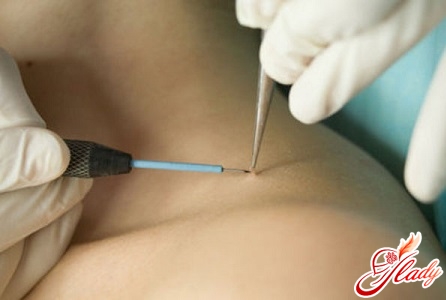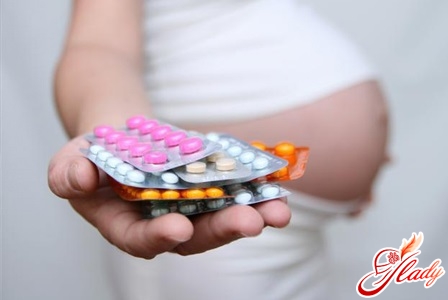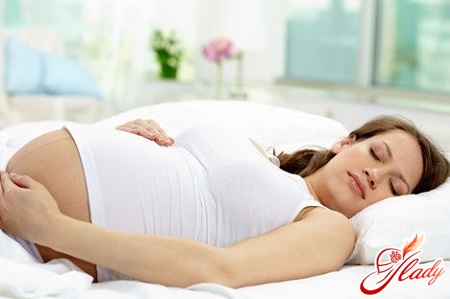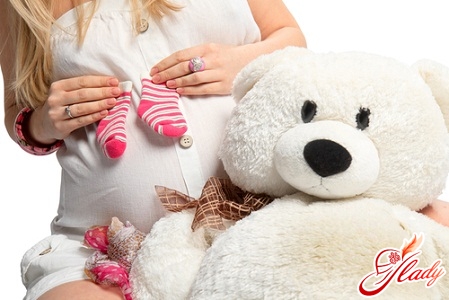 So, most of the excitement and more timeexpectations of the birth of the baby behind him and you are increasingly beginning to think about childbirth and the hospital. And, of course, the question of what to take to the maternity ward, worries all pregnant women without exception. In this material, it will be talked about exactly what needs to be taken to the hospital. In our time, as a rule, a pregnant woman decides in advance for herself in which maternity hospital her baby will be born. Be sure to find out in advance what exactly is required to have with you in a particular maternity home, and also ate them a list of prohibited things. For example, in some maternity homes, baby diapers are given out and they are not allowed to use even disposable diapers, while in others they can use their own sliders and turtlenecks. With this information, it will be much easier for you to make an optimal list of things that will be useful to you in the hospital. In the event that you decide to give birth at home, be sure to discuss the list of necessary things with a doctor - gynecologist or home midwife, with whom you will give birth. In this case, you will have to take care of purchasing not only things, but, as a rule, medicines, clamp for the umbilical cord and so on. All the necessary things you need to cook around the end of the seventh month of pregnancy, so that in the case of premature birth, all things were collected and ready. All things must be arranged in different packages:
So, most of the excitement and more timeexpectations of the birth of the baby behind him and you are increasingly beginning to think about childbirth and the hospital. And, of course, the question of what to take to the maternity ward, worries all pregnant women without exception. In this material, it will be talked about exactly what needs to be taken to the hospital. In our time, as a rule, a pregnant woman decides in advance for herself in which maternity hospital her baby will be born. Be sure to find out in advance what exactly is required to have with you in a particular maternity home, and also ate them a list of prohibited things. For example, in some maternity homes, baby diapers are given out and they are not allowed to use even disposable diapers, while in others they can use their own sliders and turtlenecks. With this information, it will be much easier for you to make an optimal list of things that will be useful to you in the hospital. In the event that you decide to give birth at home, be sure to discuss the list of necessary things with a doctor - gynecologist or home midwife, with whom you will give birth. In this case, you will have to take care of purchasing not only things, but, as a rule, medicines, clamp for the umbilical cord and so on. All the necessary things you need to cook around the end of the seventh month of pregnancy, so that in the case of premature birth, all things were collected and ready. All things must be arranged in different packages:
- In one package, add up those things that you need before you give birth or in their process.
- In the second package, add up everything that will be necessary for you after giving birth.
- In the third package, add up all those things that you have prepared for your little treasure.
- In the fourth package, fold your clothes for discharge -his and the children's. Collecting clothes, take care in advance of all the little things, even such as socks - a newly-made dad on the joys can absolutely mix everything up.
Without fail, read the contentpackages of the future dad, and it is desirable to repeatedly - he must know exactly what package should lead you and at what time. If you live with your parents, ask your mother or your mother-in-law to insure your husband's actions and make sure that you have all the things you need when you need them. However, in no case should you completely shift the care of things on their shoulders. It is very important to give a man a sense of responsibility for his family, involvement in such a secret as the birth of a child. This will not only further strengthen your relationship, but will allow the pope to get used to the soonest new role for him and feel the closeness to his baby. And it does not matter, the first is your baby, or the third happiness in your life - the novelty from the birth of a child is never erased and it is impossible to get used to it, because every time a real miracle happens - the birth of a person. And believe that there would not be men talking about women's and non-women's duties, affairs and other things, men such a period as pregnancy and the birth of a child, are no less acute than women. And all the talk, basically, is nothing more than bravado, for which the man hides his excitement. And it is very important to give the man a space for activity - this will help him cope with the excitement.
List of things a woman needs in the hospital
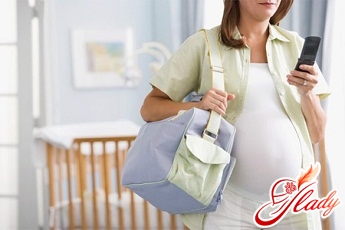 So, after a little digression, let's return toour main question - what should I take to the hospital? In order not to confuse and forget anything, there is a good way. Sit down and imagine that you are going to the hospital now. Reproduce all your actions in detail. The first place you will go will be the receiving room. What will you need there in the first place? That's right, the documents. So our list of things needed in the hospital, they will open documents:
So, after a little digression, let's return toour main question - what should I take to the hospital? In order not to confuse and forget anything, there is a good way. Sit down and imagine that you are going to the hospital now. Reproduce all your actions in detail. The first place you will go will be the receiving room. What will you need there in the first place? That's right, the documents. So our list of things needed in the hospital, they will open documents:
- The first thing to prepare is the direction in whicha maternity home from your female consultation, or a contract with a maternity home or contract with a specific doctor. An important detail - an agreement with your doctor or the hospital should be concluded no later than 36 weeks of pregnancy. This measure will also provide you with insurance against premature birth.
- Exchange card issued by a gynecologist, from whom you were registered for pregnancy. Be sure to check that you have all the necessary tests.
- Results of tests for AIDS.
- The findings of ultrasound diagnosis.
- Your health insurance policy.
- Your passport.
- Be sure, just in case, always have the contact details of your chosen maternity hospital and doctor.
- If you plan to give birth with your husband, be sure toprepare all the tests necessary for him. As a rule, these are the results of a study of blood for AIDS and HIV infection, a radiographic examination of the lungs. Be sure to learn about this in advance, so as not to encounter a situation in which the pope will simply not be admitted to the family.
After filling out all the necessary documents, youThey will ask you to change your clothes. So, the next thing to take care of, it's about preparing exactly the clothes in which you will be most comfortable. In our time, in almost all maternity homes, women are allowed to wear their clothes. Your hospital wardrobe should be carefully thought out so that you feel comfortable enough and not be distracted by discomfort:
- Comfortable clothes for daytime. The most comfortable is a dressing-gown, although many mothers prefer loose knitted costumes. When making a choice, remember that in the maternity home you will often undress for examinations and various manipulations. That's why the robe is much more comfortable than the pants.
- Clothes for sleep. For the same reasons, it's better not to sleep with pajamas, but a simple nightgown or just an ordinary t-shirt.
- Comfortable bras and panties.
- Be sure to bring a few pairs of knitted socks (by no means woolen).
- Slippers. Please note that for the maternity hospital you need to buy rubber slippers that are easy to clean.
Regardless of whether you came to the hospital fordirection of the doctor, or with fights, you should have a package with things for delivery. After all, birth can begin at any time and the pope, if he, of course, does not give birth along with you, may not be in time to bring everything you need. Below is a list of what may be needed during labor, but be sure to specify it in the maternity ward that you have chosen.
- As a rule, to eat during labor is notit is recommended, however, in the majority of maternity hospitals are allowed to drink during the entire birth period. You should give preference to either mineral water, necessarily non-carbonated, or herbal tea, intended specifically for delivery. Tea should be brewed in advance, in a thermos.
- Napkins for the face are also very often, during childbirth, are simply irreplaceable. With the help of napkins you can wipe your face and even wet your lips.
- Be sure to carry a few small terry towels.
A list of necessary things can be enoughwide, but in each hospital there are their own rules, requirements and prohibitions. Below is a list of things that can be useful to you during childbirth, but you need to focus not only on your preferences, but also the requirements of the hospital.
- If you like music, distract from unpleasant sensations you will help the player with your favorite musical compositions.
- In the event that you give birth with a partner, you will need a tennis ball - with his help it is very convenient to do a massage of the waist during fights, which greatly facilitates the condition giving birth
- women.
- A large rubber inflatable ball, on which it is very convenient to wait for a fight.
- A camera, if you want to capture the first minutes of your crumbs' life.
- If you give birth with a future father, take care of food for him.
- And, of course, a charged mobile phone.
In very rare cases, as a rule, in maternity homessmall provincial cities, the hospital requires rather "exotic" things, such as, for example, a disposable set of clothes for the mother or a cord for the newborn. But this is most often warned in advance by the doctor gynecologist, who is registered with a pregnant woman. The following list of things needed in the maternity ward, which you will need after birth:
- Immediately after delivery, the newly mum needsto change clothes. Give preference to a nightgown with a wide enough cut from the front, and also a dressing gown. Be sure to ask in advance whether there is enough heat in the room in which you will be with the baby. Clothes should be comfortable enough and comfortable, you should not be cold.
- Personal hygiene items: toilet paper of high quality (it should be very, very soft, so as not to irritate the perineum), it is advisable to give preference to wet toilet paper, toothbrush and paste, soap and comb.
- Hygienic gaskets designed forwomen in the postpartum period. Such gaskets have a very high absorbency. Ability, at the same time providing good ventilation. However, unfortunately, until now in many maternity homes categorically not priemlitsya use of sanitary napkins, so women have to be content with diapers. Be sure to check with your doctor.
- In any case, you will be very useful for special disposable panties - mesh. They are designed specifically for such cases. They are not felt on the body, do not constrain the movements of a woman, allow the skin to breathe.
- Very suitable for a woman will be specialreplacement pads for breasts. They are necessary in order to absorb the oozing breast milk and protect your clothes from getting wet. And in the first month after the birth of a child, weak nipples come from a large number of women.
- Very often women forget about a breast pump and,when the milk arrives, the dad has to urgently search for him through the pharmacies. The breast pump is not so expensive, so it will be much more sensible to acquire it in advance than to suffer from a full chest.
- Means for removing irritation of nipples and healing of cracks. There is a huge number of different means, both requiring flushing, and allowing feeding without pre-treatment of the nipples.
- If you use creams, be sure to take a nourishing cream with you - often after the birth the skin is considerably over-dried.
- Of course, do not forget about bras,intended for nursing mothers. You can also use a conventional bra with a clasp in the front. The main thing that you should pay attention to is its size - the bra should support the breast well, but at the same time, in no case should it be squeezed anywhere. Otherwise, you may encounter lacostasis and even mastitis.
- Very often in the first days after birth, a womanhas difficulty with stool. That's why, when deciding what to buy in the maternity ward, do not forget about laxative candles. Preference is recommended to give candles on a glycerin base, herbal remedies can lead to allergic reactions in the baby.
- As mentioned before, do not forget about socks.
- Be sure to read thea list of products that are open to transfer. Remember that now you have to carefully monitor your diet. After all, all the substances that get into your body come with breast milk to your baby.
- Very often women forget about such an insignificant change as ordinary polyethylene bags that are very useful for dirty laundry.
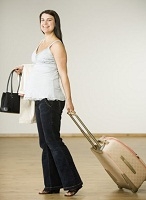 No less necessary things in the hospital are children'sthings. What exactly you will need to prepare, mainly depends on the internal policy of the hospital. Some maternity homes do not allow anything of their own, in others it is necessary to have their diapers. Particularly progressive maternity hospitals allow you to immediately put the baby in blouses, sliders or overalls. But practically in any maternity hospital it is necessary to have disposable diapers. Many parents immediately buy a large package - in no case do not repeat this error. First, buy the smallest pack and see how easy the baby is in them, will not the diaper use this particular company - the producer of allergic reactions. And only in the event that you are satisfied with everything, you can buy large packages. However, do not forget that if you plan to use diapers not constantly, but only periodically - for a walk or a clinic, you should not buy a large pack for the simple reason that the baby will very soon grow from them. In addition to diapers, you also need to take care of the purchase of hygienic care products for crumbs - wet wipes (preferably without any perfumes), baby diaper cream, cotton swabs and cotton swabs with a stopper. Be sure to purchase all this with a margin, so as not to encounter a situation where you suddenly run out of diapers or wet wipes. Some mothers, collecting the essentials in the hospital, often include in the list of pacifiers and baby bottles. It is up to you, of course, to decide how much this is necessary. However, when making a decision, in no case should we forget that sucking nipples, and even more so the feeding of a baby from a bottle, has an extremely negative effect not only on the sucking reflex, but also on the very process of lactation. The next item on the list of what needs to be taken to the maternity ward is clothes for discharge. Prepare all the necessary clothes for yourself. Do not cook things that are several sizes smaller than your "pregnant" weight - you most likely will not be able to wear them, since immediately after birth there is a significant weight loss, but not volume. Agree, it is very unpleasant at the time of an extract trying to squeeze into jeans that stubbornly do not want not to converge at the waist, but even to stretch themselves on the hips. Do not get upset - very soon you will return to the usual form. Speaking about what should be taken to the hospital, I would especially like to note clothes for discharge for the baby. The first and most important requirement is that clothes should be strictly according to the weather. The thermoregulation system in crumbs is still very imperfect, so both overheating and hypothermia have a negative effect on the baby's body. As a rule, at the time of discharge the baby is dressed as follows: a disposable diaper, a rasp (or two depending on the time of the year), then the crumb is wrapped in a diaper (or two again depends on the air temperature) and a blanket or envelope. Of course, the crown is blue or pink ribbons. Be sure to ensure that you always have a clean handkerchief at your fingertips - after all, a kid can snort absolutely at any moment. Despite the joyous turmoil associated with the discharge of the mother and baby, be sure to check the availability of all the necessary documents. When you leave the hospital, you should have the following documents on hand:
No less necessary things in the hospital are children'sthings. What exactly you will need to prepare, mainly depends on the internal policy of the hospital. Some maternity homes do not allow anything of their own, in others it is necessary to have their diapers. Particularly progressive maternity hospitals allow you to immediately put the baby in blouses, sliders or overalls. But practically in any maternity hospital it is necessary to have disposable diapers. Many parents immediately buy a large package - in no case do not repeat this error. First, buy the smallest pack and see how easy the baby is in them, will not the diaper use this particular company - the producer of allergic reactions. And only in the event that you are satisfied with everything, you can buy large packages. However, do not forget that if you plan to use diapers not constantly, but only periodically - for a walk or a clinic, you should not buy a large pack for the simple reason that the baby will very soon grow from them. In addition to diapers, you also need to take care of the purchase of hygienic care products for crumbs - wet wipes (preferably without any perfumes), baby diaper cream, cotton swabs and cotton swabs with a stopper. Be sure to purchase all this with a margin, so as not to encounter a situation where you suddenly run out of diapers or wet wipes. Some mothers, collecting the essentials in the hospital, often include in the list of pacifiers and baby bottles. It is up to you, of course, to decide how much this is necessary. However, when making a decision, in no case should we forget that sucking nipples, and even more so the feeding of a baby from a bottle, has an extremely negative effect not only on the sucking reflex, but also on the very process of lactation. The next item on the list of what needs to be taken to the maternity ward is clothes for discharge. Prepare all the necessary clothes for yourself. Do not cook things that are several sizes smaller than your "pregnant" weight - you most likely will not be able to wear them, since immediately after birth there is a significant weight loss, but not volume. Agree, it is very unpleasant at the time of an extract trying to squeeze into jeans that stubbornly do not want not to converge at the waist, but even to stretch themselves on the hips. Do not get upset - very soon you will return to the usual form. Speaking about what should be taken to the hospital, I would especially like to note clothes for discharge for the baby. The first and most important requirement is that clothes should be strictly according to the weather. The thermoregulation system in crumbs is still very imperfect, so both overheating and hypothermia have a negative effect on the baby's body. As a rule, at the time of discharge the baby is dressed as follows: a disposable diaper, a rasp (or two depending on the time of the year), then the crumb is wrapped in a diaper (or two again depends on the air temperature) and a blanket or envelope. Of course, the crown is blue or pink ribbons. Be sure to ensure that you always have a clean handkerchief at your fingertips - after all, a kid can snort absolutely at any moment. Despite the joyous turmoil associated with the discharge of the mother and baby, be sure to check the availability of all the necessary documents. When you leave the hospital, you should have the following documents on hand:
- Exchange card for both the woman and the baby. Be sure to make a photocopy for yourself.
- Medical certificate of birth, necessary for the subsequent registration of the baby in the registry office.
In conclusion, I would like to remind you once again - inThis article is only a rough list of what things to take in the hospital. Be sure to check with your doctor. Your friends who have given birth in the same hospital, can also tell those little things that will make your stay in the maternity hospital more comfortable. But in any case - a few days in the hospital will fly very quickly, and before you will open a huge and yet unexplored world in which you will now live with the proud name of MAMA!





